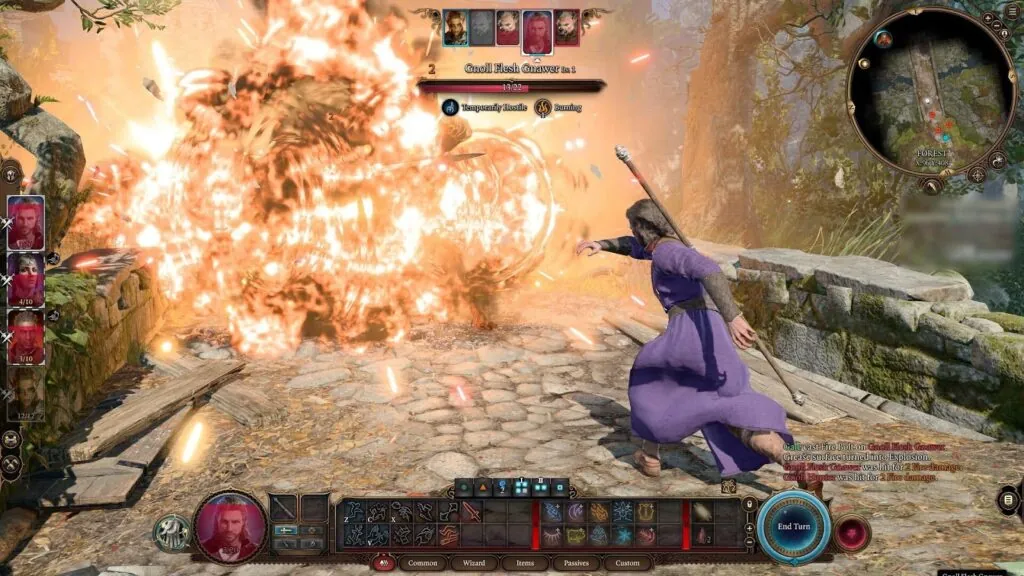Sometimes in games it’s not the grand story arcs that captivate me most, but the small episodes born out of mechanics, chance, and my own decisions. These moments aren’t advertised on covers, yet they are the ones that turn a play session into a story. I see them as an improvisation between me and the system of rules, where the outcome can’t be calculated in advance. When everything falls into place, it feels like a personal discovery, even if no one else ever sees it. These episodes create the kind of memory about a game that I want to return to.
Baldur’s Gate 3 – When The Dice Dictate The Drama
In Baldur’s Gate 3, any skill check can suddenly turn a scene in an unexpected direction. A failed persuasion attempt may cause a companion to start doubting my decisions, and from that moment the entire group dynamic begins to shift. Sometimes a single stealth check is enough to transform a peaceful passage through a location into an unplanned battle, or a seemingly simple conversation into a conflict. This unpredictability is what turns ordinary gameplay episodes into micro-stories that are impossible to forget.
It shows itself most clearly in combat, where even small details like the placement of barrels or a random critical hit can completely change the flow of a fight. I’ve seen how one flaming arrow in a powder storage flipped the outcome of a battle, turning it into either a comedy or a tragedy. Players eagerly share similar stories in compilations and streams like latest gaming news, where these episodes live a life of their own. Everyone ends up with their own personal version of events, and that makes community discussions especially fascinating.
But what amazes me the most are the consequences that can reveal themselves hours later. In the swamp, I might save a random character without giving it much thought, only to discover later that this encounter rewrote an entire quest chain and reshaped the final choice. I don’t feel like a spectator here—on the contrary, the game seems to acknowledge me as a co-author. And in that, I think, lies the true value of Baldur’s Gate 3: even the smallest accident can grow into a personal legend.
Red Dead Redemption 2 – A Sandbox Of Consequences
In Red Dead Redemption 2, legends are born out of details that at first seem insignificant. A horse stumbles on a slope, a shot goes off at the worst possible moment, a passerby notices blood — and suddenly it all triggers a chain of events. The game simulates the environment with such precision that even a simple ride across the prairie can unexpectedly turn into a story worth retelling.
Here the world isn’t just a backdrop but a full-fledged participant in events. Weather, mud underfoot, and NPC reactions to the smallest actions create the feeling that I’m living in a real space. If someone hears a gunshot, an investigation begins. If I accidentally bump into a stranger in town, it never goes unanswered: it can escalate from a verbal spat to a duel. Thanks to these details, every decision feels weighty, and the cost of a mistake becomes almost physically tangible.
One of the most memorable episodes for me happened when I accidentally ran over a passerby on a farm. At first, it looked like a simple misunderstanding — I even tried to apologize. But within seconds it escalated into a fight, and by evening the sheriff came after me. A chase began, with local townsfolk joining in, and the consequences dragged on for a long time: reputation, money, new conflicts. And none of this was a cutscene or a pre-scripted event — it was the direct result of my imperfect actions.
The Witcher 3 – Side Quests As A Generator Of Small Dramas
In The Witcher 3, even a short encounter in the field can turn into a small drama. At first glance, it all seems simple: kill the monster. But gradually it becomes clear that behind it are people who helped it appear or who profited from its existence. And then the choice stops being purely technical. What matters isn’t whether I get a reward, but what moral consequences I leave behind.
I especially value the moments when consequences don’t arrive immediately. A decision I made an hour earlier might suddenly come back in a different part of the map. I might think I did the right thing — helped a village, drove off a monster — but later I find strange results: the village abandoned, or someone else suffering because of my intervention. It never feels contrived, quite the opposite — the world reacts to my actions honestly and logically, even if it’s inconvenient for the hero.
Even the most basic mechanics can create micro-stories. Once, a sign of Aard accidentally knocked an enemy off a bridge, and that single second felt like an epic moment. Another time, a random piece of loot from a chest changed my build and forced me to chart a new route across an entire region. Dozens of such moments pile up, forming my own version of the journey, different from that of any other player. That, to me, is the strength of The Witcher 3: the game turns even the daily grind of witcher work into personal legends.
Online Legends That Live Beyond The Game
Multiplayer games have a unique quality — their most iconic stories often come from players, not developers. One unusual action can spread across Reddit, Discord, and forums, turning a simple match or bug into a myth known far beyond the game itself.
Examples are everywhere: Leeroy Jenkins in World of Warcraft became a symbol of reckless charges, the Falador Massacre in RuneScape turned a bug into a historic event, the battle of B-R5RB in EVE Online was documented like a real war, and Minecraft’s Herobrine myth showed how community imagination creates enduring legends.

What unites them is their life outside the game. They evolve into memes, fan art, and stories retold for years. To me, this proves the community can craft legends as powerful as any official quest — only these ones never end.
Conclusion
Personal legends emerge where the mechanics allow risk, chance, and consequences. They can’t be scripted — only triggered by careful play and a willingness to embrace unpredictability. It’s these episodes that keep Baldur’s Gate 3, RDR2, and The Witcher 3 alive long after the main story is over. And the legends from online games remind me that sometimes the best storyteller is the community itself, testing the rules we all share.




